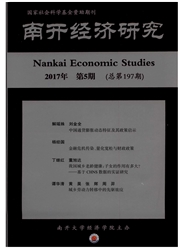

 中文摘要:
中文摘要:
利用中国综合社会调查(CGSS)数据,本文考察了地区性别比对个体生育性别偏好的影响。结果表明,当地区性别比增高,该地区个体对生育男孩的偏好程度将会下降;上述结果在多种检验中均稳健可靠。我们提出婚配竞争压力假说解释上述现象:地区性别比越高,该地区男性在婚配竞争中压力越大,从而导致家庭生育性别偏好发生改变。我们以地区房价、家庭拥有房产数、家庭经济状况等来表征个体和家庭面临的婚配竞争压力或承受这种压力的能力,实证研究结果支持上述假说:性别失衡的确会通过加剧婚配竞争影响个体生育偏好;婚配竞争压力越大,或者家庭承受婚配竞争压力的能力越小,性别失衡对个体生育男孩偏好的削弱作用就越显著,反之则小得多甚至不显著。
 英文摘要:
英文摘要:
Based on CGSS data, this paper examines how regional sex ratio influences personal childbearing preferences. The result shows that the son preferences will decrease with the increase of regional sex ratio. We conclude a reliable result by using a series of robustness tests. We then propose an assumption, the pressure of mating competition, to explain this phenomenon: the higher the sex ratio of an area is, the higher the pressure of man has in mating competition, which will change the family childbearing preferences. We use regional housing price, family housing area and economic status to represent the pressure of mating competition or the ability to endure the pressure. The empirical evidence supports the assumption: sex imbalance will certainly increase the mating competition to influence childbearing performances; the greater the pressure of mating competition is, or the less the ability which family can endure, the more significant the weakening effect of the sex imbalance on son preferences, otherwise the effect is much smaller or insignificant
 同期刊论文项目
同期刊论文项目
 同项目期刊论文
同项目期刊论文
 期刊信息
期刊信息
